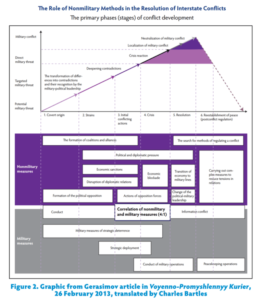
How did the U.S. and its partners so badly underestimate Russia’s ability to project influence using modern soft power technologies? Global Risk Insights asks in a must-read analysis.
One of the main messages of the International Conference on Cyber Conflict (CyCon18) was that the future of the democratic world relies on the ability of democratic state and non-state actors to “anticipate, adapt, and innovate”, says GRI Editor-in-Chief, Alisa Lockwood, It’s impossible to prevent mistakes and oversights completely, but a few guiding principles may help to improve state actors’ ability to anticipate and adapt in future, she writes:
- First, be aware of bias, but also of exceptionalism along the lines of “Sure, this is happening over there, but it could never happen to us!”
 Second, avoid being dismissive of ideas that challenge the status quo. Ironically, General Gerasimov advocated precisely for this: “A scornful attitude toward new ideas, to nonstandard approaches, to other points of view is unacceptable in military science.” To illustrate – in 2005, General James Mattis published an article on “The Rise of Hybrid Wars” in which he emphasised the importance of information operations and wars of ideas. ……
Second, avoid being dismissive of ideas that challenge the status quo. Ironically, General Gerasimov advocated precisely for this: “A scornful attitude toward new ideas, to nonstandard approaches, to other points of view is unacceptable in military science.” To illustrate – in 2005, General James Mattis published an article on “The Rise of Hybrid Wars” in which he emphasised the importance of information operations and wars of ideas. ……- Third, pay attention not just to political cues but to cultural ones as well, and act accordingly, laying foundations for engagement beyond the Putin era and thus dialing down the need for infowars. At present, for instance, there is a glimmer of hope: polling by the Levada Centre has shown that Russians’ negative perception of the West is being reversed from its 2015 high, and that increasing numbers of Russians believe rapprochement with the West is necessary. In 2018 alone, Levada found, the proportion of Russians who have a positive perception of the U.S. doubled to 42%.
- Fourth, maximize the diversity of intelligence sources being analysed for clues as to Russian behavior, and be clear about the indicators that matter. This may be obvious but seems not always to be practiced. Official statements and speeches, laws and doctrines, academic research, nuanced Russia-based analysis (it exists!), state-owned media, as well as Western experts. Peter Pomerantsev was one of the few who accurately assessed what Russia was doing – albeit also with a significant delay, sounding warnings in 2014 and 2015.
‘Truth’ is power: Controlling the narrative
Vladimir Putin’s KGB background would undoubtedly have made him aware of the value of disinformation and controlling the public narrative, Lockwood adds, but where the Soviet Union had communist propaganda, the new Russia had PR – public relations. Specifically, it had Vladislav Surkov, Putin’s key ideologist and strategist, who claims to have helped orchestrate the transition of power from Yeltsin to Putin. The consolidation of the Putin regime rested, essentially, on four pillars, she adds:
- the suppression of Chechen militancy;
- the formation of the United Russia party (2001);
- the bringing to heel of the oligarchs (Surkov’s former boss Khodorkovsky, then Russia’s richest man, was arrested in 2003); and
- the nationalisation of large swathes of the print and broadcast media.
Regaining control of the media was rooted in the newly developed Information Security Doctrine of 2000, a document that continues to be updated and important to understanding what Russia sees as threats in the information space, Lockwood adds. RTWT







